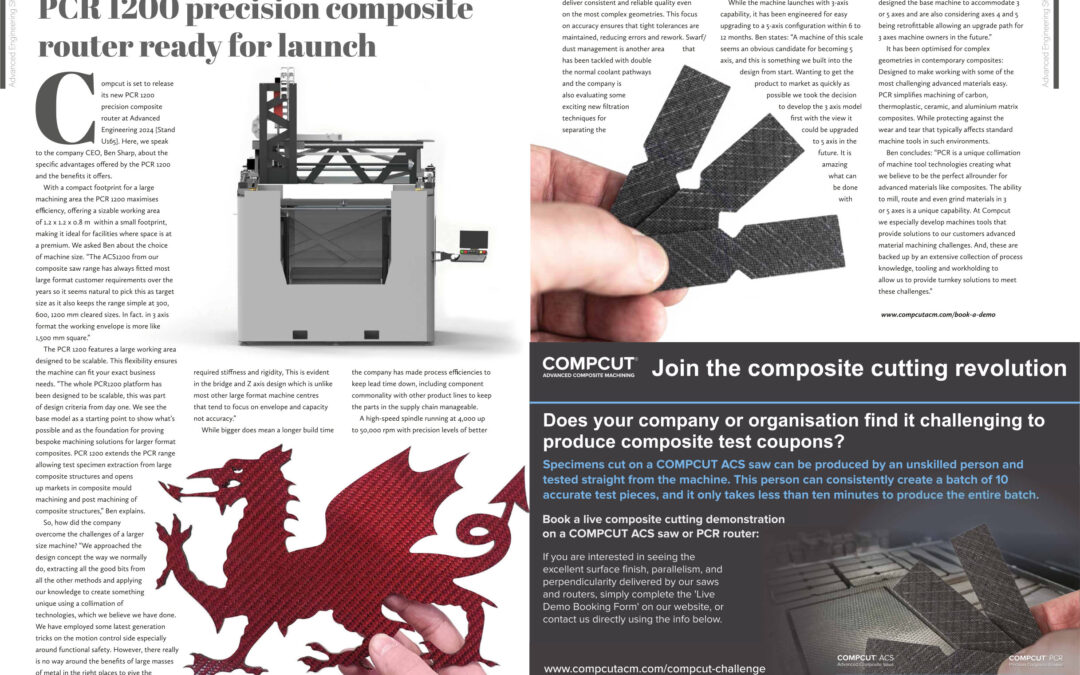The new COMPCUT PCR 1200 is ready for launch! Read this excellent article in M&MT Magazine about our latest precision composite router, specifically designed to accurately machine composite materials, create moulds, and produce high-quality production parts: https://www.calameo.com/read/0044319711af91a2033c4
———————————————————— ———————————————-
Compcut is set to release its new PCR 1200 precision composite router at Advanced Engineering 2024
Compcut is set to release its new PCR 1200 precision composite router at Advanced Engineering 2024 [Stand U165]. In this article, we speak with the company’s CEO, Ben Sharp, about the specific advantages offered by the PCR 1200 and the benefits it brings to composite machining.
The PCR 1200 maximizes efficiency with a compact footprint while offering a sizable working area of 1.2 x 1.2 x 0.8 meters, making it ideal for facilities where space is at a premium. We asked Ben about the choice of machine size. He explained, “The ACS1200 from our composite saw range has always met most large-format customer requirements over the years, so it seemed natural to target this size. It also keeps the range simple with 300, 600, and 1200 mm cleared sizes. In fact, in a 3-axis format, the working envelope is closer to 1,500 mm square.”
Scalable Design for Flexibility
The PCR 1200 features a large working area designed to be scalable, ensuring that it can be tailored to meet specific business needs. “The whole PCR1200 platform was designed to be scalable from the start,” Ben notes. “We see the base model as a starting point to showcase what’s possible and as a foundation for developing bespoke machining solutions for larger-format composites. The PCR 1200 extends the PCR range, allowing test specimen extraction from large composite structures and opening up markets in composite mould machining and post-machining of composite structures.”
Overcoming the Challenges of Size
So, how did the company overcome the challenges of building a larger machine? “We approached the design concept as we always do, taking the best elements from various methods and applying our expertise to create something unique,” Ben says. “We incorporated cutting-edge technologies in motion control, particularly around functional safety. However, you can’t bypass the benefits of large masses of metal in the right places to achieve the necessary stiffness and rigidity. This is evident in the bridge and Z-axis design, which differs from most other large-format machine centres that focus more on capacity than accuracy.”
While the larger size does mean a longer build time, the company has introduced process efficiencies to minimize lead time. For instance, they’ve ensured component commonality with other product lines to keep parts manageable within the supply chain.
Precision and Performance
The PCR 1200 features a high-speed spindle running from 4,000 up to 50,000 RPM, delivering precision levels better than 1 micron. It is engineered to provide consistent, reliable quality, even for the most complex geometries. This focus on accuracy reduces errors and the need for rework.
Swarf and dust management have been addressed with double the standard coolant pathways, and the company is evaluating exciting new filtration techniques for separating composite debris from the coolant.
Although the machine launches with 3-axis capability, it is designed for easy upgrades to 5-axis configuration within 6 to 12 months. “A machine of this scale is an obvious candidate for 5-axis capability, and this is something we built into the design from the start,” Ben explains. “To bring the product to market quickly, we developed the 3-axis model first, with the plan to offer 5-axis upgrades later. It’s amazing what can be done with just 3 axes and the right tooling. We’ve designed the base machine to accommodate either 3 or 5 axes, and we are considering making axes 4 and 5 retrofittable, allowing an upgrade path for 3-axis machine owners.”
Optimized for Advanced Materials
The PCR 1200 is optimized for machining complex geometries in advanced composites. It simplifies working with challenging materials like carbon, thermoplastics, ceramic, and aluminum matrix composites, while protecting against the wear and tear that typically affects standard machine tools in such environments.
Ben concludes, “The PCR 1200 is a unique combination of machine tool technologies, creating what we believe to be the perfect all-rounder for advanced materials like composites. Its ability to mill, route, and even grind materials in 3 or 5 axes is a unique capability. At Compcut, we develop machine tools that provide solutions to our customers’ advanced material machining challenges, backed by extensive process knowledge, tooling, and workholding to offer turnkey solutions.”
For more information or to book a demo, visit:
www.compcutacm.com/book-a-demo

